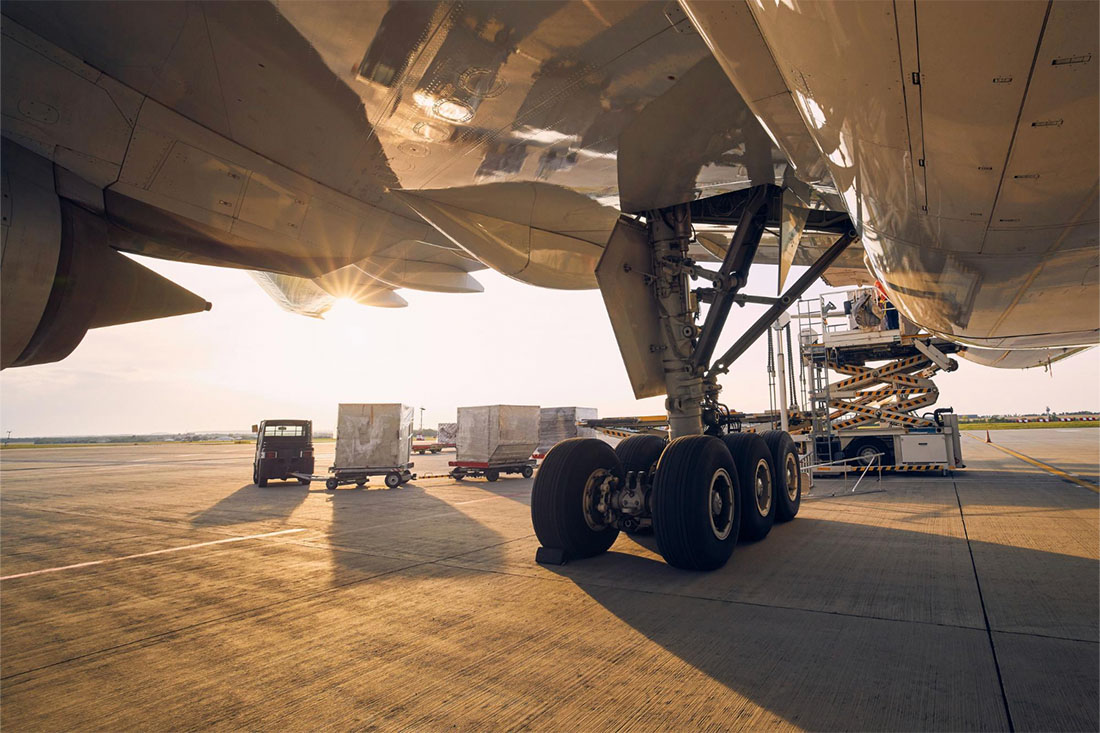The aviation industry continues to recover from the effects of the COVID-19 pandemic and is forecast to improve in the remainder of 2022 and beyond. The number of cargo-only flights remains high, with passenger aircraft cabins also providing a reliable response to shipment demand. At AGI, we have connections with over 250 locations worldwide and work closely with airports around the world to bring goods into and out of the UK.
If you’re curious about the logistics surrounding air freight, or are searching for your next distributor, read on to find out more about why air freight might be right for you.
What is air freight?
Air freight is a way of shipping goods through an air carrier like a plane. Air freight is one of the most efficient modes of transport of cargo, and is the fastest way to internationally transport goods.
Freight services have been around for hundreds of years, with many companies opting for air freight services as they provide a reliable service with which to get a product from one place to another quickly and conveniently. Over the years, the volume of air freight shipping has increased, allowing businesses to keep less inventory on hand and produce a wider range of products due to extra internal storage space.
How does air freight work?
Shipping goods via air freight requires a Master Airway Bill (MAWB) authorised by the airline or agent, providing evidence of the contract of freight.
This method can be made particularly cost-effective if consolidated into consoles with other shipments. However, although this is beneficial in terms of economies of scale, it is important to factor in the time it can take to group shipments together.
Types of air freight
Shipments of goods can take place in a dedicated freight aircraft, or stored in the hold of a passenger plane. There are a few different categories of air freight:
- Consolidated freight – where one flight contains multiple shipments from different companies
- Direct / back-to-back services – where a flight contains only one shipment
- Charter services – where a plane is chartered for a single delivery (particularly useful if you require a larger shipment to be delivered, or have specialist cargo)
Types of air cargo
There are two main types of air cargo:
General cargo: This type of cargo includes high-value goods such as electronics and pharmaceuticals.
Special cargo: Special cargo usually refers to goods that require specific conditions during transportation, such as protected casing or temperature control.
Advantages of air freight
Air freight is regarded as a highly efficient means to transport cargo both nationally and internationally.
Efficiency: Transporting goods via air freight saves time and is much quicker compared to ground transport, particularly when using a direct service.
Reliability: Cargo flights are generally reliable when it comes to arrivals and departures, so shipments are likely to arrive on time with few delays.
Security: Air cargo shipments are managed by security teams, so the chance of damage to products or stolen shipments is low. Flights are also tracked, allowing shipments to be more easily traceable.
Good value: Air freight charges are based on weight rather than volume, which can result in very cost effective deliveries if you have smaller items to ship.
Competitive advantage: Using air freight can aid in competition against other producers, where fast delivery times can replenish product stock if demand increases and delayed productions can be counteracted by air shipments.
What cannot be shipped by air freight?
While many items can be shipped via air freight, it’s important to be aware of those which are not permitted:
- Anything classified as ‘dangerous goods’ by the UN
- Any illegal goods
- Power supplies/banks and lithium batteries
- Flammable substances and explosives
- Firearms
- Biochemical products
How much does air freight cost?
Air freight pricing can be broken down into a few main factors:
- Type of shipment – weight and size of goods, plus any special requirements
- Destination – whether the shipment needs to arrive at an international/local airport or a goods-only location
- Speed of delivery required
- Additional costs such as customs, taxes, insurance, and any surcharges.
Air freight is a particularly worthwhile investment in your process, and is best used for shipping products that must arrive at their destination quickly, when time sensitivity is a defined issue.
When you require a professional and specialist air freight transportation service, contact AGI Global.
